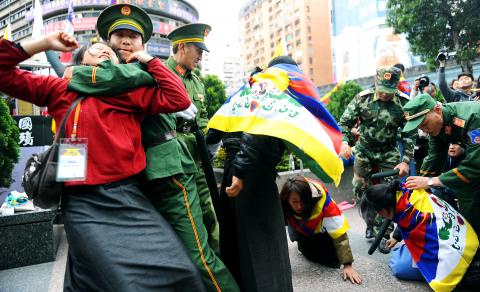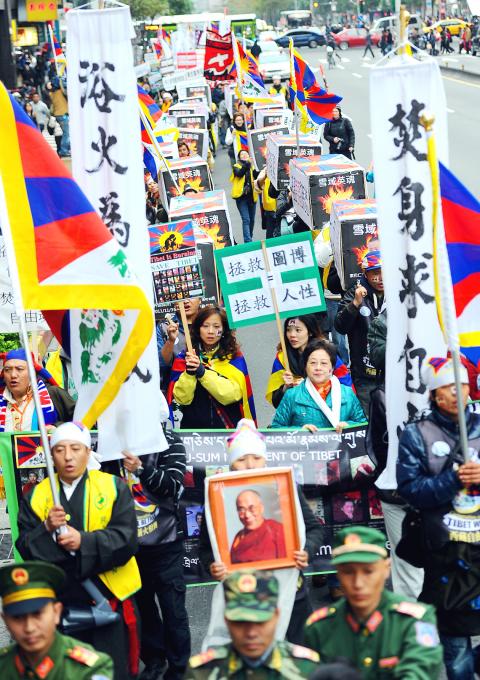Hundreds of people — Tibetans and non-Tibetans alike — marched in Taipei yesterday to commemorate the 53rd anniversary of the 1959 Tibetan uprising against Chinese rule and to remember the Tibetans who have set themselves on fire to protest China’s violation of their freedoms of religion and expression.
Carrying model coffins covered with Tibetan flags and with pictures of the 28 Tibetans who have self-immolated in protest at Chinese rule in Tibet since March last year, 18 of whom have died, and following banners that read “Burned for Tibet” and “Immolated for freedom,” hundreds of people chanting slogans marched from the Zhongxiao Fuxing MRT station to Taipei 101.
“Tibet was an independent country until the Chinese invasion in 1950, which turned us into refugees,” Regional Tibetan Youth Congress Taiwan president Tenzin Chompel told demonstrators before they began their march. “Since 1950, we Tibetans have been fighting for our freedom, and recently 28 people set themselves on fire for our freedom and religion.”

Photo: Chang Chia-ming, Taipei Times
Tibetans have never ceased their resistance to Chinese occupation since the invasion in 1950. In 1959, a large-scale uprising occurred, leading to a brutal crackdown by the Chinese, and the escape of the 14th Dalai Lama across the Himalayas into Tibet.
“For [exiled Tibetans’] right to go home and for the independence of our country, we will continue the struggle,” Tenzin Chompel said.
Taiwan Friends of Tibet president Chow Mei-li (周美里) called on Taiwanese to show their support for the Tibetans’ struggle, because the majority of Taiwanese, like Tibetans, are Buddhists.

Photo: Chang Chia-ming, Taipei Times
She also urged President Ma Ying-jeou (馬英九) to speak out on Tibet.
“When President Ma keeps silent as Tibetans suffer, he is an accomplice,” she said. “Ma should stop all cross-strait religious exchanges until China withdraws armed forces from Tibetan temples and monasteries.”
A number of Democratic Progressive Party (DPP) politicians — including legislators Tuan Yi-kang (段宜康), Yu Mei-nu (尤美女), Chen Chieh-ju (陳節如), Taipei City Councilor Chien Yu-yen (簡余晏), former Tainan County commissioner Su Huan-chih (蘇煥智) and DPP deputy secretary-general Kao Chien-chih (高建智) — took part in the march.
“I’m ashamed to be the citizen of a country where government officials have close ties with Chinese officials and pretend they do not see what is happening in Tibet — I apologize to you [Tibetans] for it,” Tuan said. “But I assure you that not all Taiwanese are cowards like our government officials.”
Once the parade reached Sun Yat-sen Memorial Hall, all of the marchers lay down on the road in silence for three minutes in memory of Tibetans who had sacrificed their lives for the Tibetan cause.
“When you lie on the street, think of the Tibetans who fell on the soil of Tibet because they were shot by Chinese troops as they took to the streets calling for freedom, just as we are doing now,” one parade organizer said.
In addition to Tibetans and their Taiwanese supporters, there were participants from many countries.
“The Tibetan situation is getting more and more severe, and it’s unacceptable to anyone in the world. That’s why people in many countries around the world are taking to the streets today to express their support for Tibet,” said Julie Couderc, a French national and doctoral student at National Taiwan University’s Graduate Institute of National Development. “This is also why I feel that I must come here to stay with the Tibetans — human rights is the most fundamental thing.”
Amnesty International Taiwan board member Tashi Tsering, an Indian-born Tibetan-Taiwanese, thanked the Taiwanese for their support, which, he said, made them proud of telling exiled Tibetans in India that they are from Taiwan.
“I’ve been in Taiwan for 14 years. Ten years ago, we felt ashamed to tell other Tibetans that we’re from Taiwan, because at the time, no one knew about the Tibetan issue, and that the government considered Tibet an inseparable part of the Republic of China,” Tashi said.
“Now we’re proud to tell other Tibetans where we’re from, because all Tibetans living in exile or within Tibet can see how supportive the Taiwanese are of our struggle for freedom,” Tashi said.

Alain Robert, known as the "French Spider-Man," praised Alex Honnold as exceptionally well-prepared after the US climber completed a free solo ascent of Taipei 101 yesterday. Robert said Honnold's ascent of the 508m-tall skyscraper in just more than one-and-a-half hours without using safety ropes or equipment was a remarkable achievement. "This is my life," he said in an interview conducted in French, adding that he liked the feeling of being "on the edge of danger." The 63-year-old Frenchman climbed Taipei 101 using ropes in December 2004, taking about four hours to reach the top. On a one-to-10 scale of difficulty, Robert said Taipei 101

Taiwanese and US defense groups are collaborating to introduce deployable, semi-autonomous manufacturing systems for drones and components in a boost to the nation’s supply chain resilience. Taiwan’s G-Tech Optroelectronics Corp subsidiary GTOC and the US’ Aerkomm Inc on Friday announced an agreement with fellow US-based Firestorm Lab to adopt the latter’s xCell, a technology featuring 3D printers fitted in 6.1m container units. The systems enable aerial platforms and parts to be produced in high volumes from dispersed nodes capable of rapid redeployment, to minimize the risk of enemy strikes and to meet field requirements, they said. Firestorm chief technology officer Ian Muceus said

MORE FALL: An investigation into one of Xi’s key cronies, part of a broader ‘anti-corruption’ drive, indicates that he might have a deep distrust in the military, an expert said China’s latest military purge underscores systemic risks in its shift from collective leadership to sole rule under Chinese President Xi Jinping (習近平), and could disrupt its chain of command and military capabilities, a national security official said yesterday. If decisionmaking within the Chinese Communist Party has become “irrational” under one-man rule, the Taiwan Strait and the regional situation must be approached with extreme caution, given unforeseen risks, they added. The anonymous official made the remarks as China’s Central Military Commission Vice Chairman Zhang Youxia (張又俠) and Joint Staff Department Chief of Staff Liu Zhenli (劉振立) were reportedly being investigated for suspected “serious

American climber Alex Honnold is to attempt a free climb of Taipei 101 today at 9am, with traffic closures around the skyscraper. To accommodate the climb attempt and filming, the Taipei Department of Transportation said traffic controls would be enforced around the Taipei 101 area. If weather conditions delay the climb, the restrictions would be pushed back to tomorrow. Traffic controls would be in place today from 7am to 11am around the Taipei 101 area, the department said. Songzhi Road would be fully closed in both directions between Songlian Road and Xinyi Road Sec 5, it said, adding that bidirectional traffic controls would